#edward bond
Explore tagged Tumblr posts
Text

We may seem competent, but by the end of next century there will be new deserts, new ruins.
-- Edward Bond
(Bucharest, Romania)
#ruins#future#changes#edward bond#travel photography#bucharest#romania#street photography#quote#modern ruins
263 notes
·
View notes
Text
A list of some of my favorite theatre-related quotes:
"He's not the finest character that ever lived. But he's a human being, and a terrible thing is happening to him. So attention must be paid." – Arthur Miller
"I know that my works are a credit to this nation and I dare say they will endure longer than the McCarran Act.” –Arthur Miller
"Don't be seduced into thinking that that which does not make a profit is without value.” – Arthur Miller
"Theater has an incredible capacity to move people to social change, to address issues, to inspire social revolution.” – Eve Ensler
"The word theatre comes from the Greeks. It means the seeing place. It is the place people come to see the truth about life and the social situation." – Stella Adler
"I like the ephemeral thing about theatre, every performance is like a ghost - it's there and then it's gone." – Maggie Smith
"That's the magic of art and the magic of theatre: it has the power to transform an audience, an individual, or en masse, to transform them and give them an epiphanal experience that changes their life, opens their hearts and their minds and the way they think.” – Brian Stokes Mitchell
"I think theatre to some extent is always about telling stories, isn't it, and I think what I've learned is that freedom comes when you tell your story; freedom comes when you tell the truth.” – Eve Ensler
"We have the ability to change people's minds and hearts - that's what we want to do with theatre. That's what theatre does... period." – Gavin Creel
"I've always been a believer in the power of art - and music in particular - to inspire change." – Gavin Creel
"Unless the theatre can ennoble you, make you a better person, you should flee from it." Konstantin Stanislavski
"The greatest wisdom is to realize one's lack of it." – Konstantin Stanislavski
"Create your own method. Don't depend slavishly on mine. Make up something that will work for you! But keep breaking traditions, I beg you." – Konstantin Stanislavski
"I don't know what really makes a great musical or not. In the end, you write it, and you write it because you want to write it." – Andrew Lloyd Webber
"You're the luckiest person in the entire world if you know what you really want to do, which I was lucky enough to know when I was very young. And you're the luckiest person in the world if you can then make a living out of it." – Andrew Lloyd Webber
"Obviously, you would give your life for your children, or give them the last biscuit on the plate. But to me, the trick in life is to take that sense of generosity between kin, make it apply to the extended family and to your neighbour, your village and beyond." – Tom Stoppard
"Great theatre is about challenging how we think and encouraging us to fantasize about a world we aspire to." – Willem Dafoe
"I regard the theatre as the greatest of all art forms, the most immediate way in which a human being can share with another the sense of what it is to be a human being." – Thornton Wilder
"Once in awhile, there's stuff that makes me say, That's what theatre's about. It has to be a human event on the stage, and that doesn't happen very often." – Uta Hagen
"The theatre is a spiritual and social X-ray of its time." – Stella Adler
"Theatre was my first love. I can't take the theatre out of me. And I wouldn't want to. To me, it's home." – Jim Parsons
"The way the world is, I think a silly evening in the theatre is a good thing, to take our minds off terror." – Tim Curry
"The theatre is the involuntary reflex of the ideas of the crowd." – Sarah Bernhardt
"Mum wasn't at all religious, but she thought that going to the theatre was as important a ceremonial, communal experience that a person could have." – Hayley Atwell
"In the end I think theatre has only one subject: justice." – Edward Bond
"I feel there's a power in theatre, but it's an indirect power. It's like the relationship of the sleeper to the unconscious. You discover things you can't afford to countenance in waking life. You can forget them, remember them a day later or not have any idea what they are about." – Tony Kushner
"The way you give love is the most profoundly human part of you. When people say it's ugly or a perversion or an abomination, they're attacking the center of your being." – Tony Kushner
"The more you go to a theatre and the more you hear stories you aren't necessarily familiar with, the more open you become." – Lynn Nottage
"I think folks who are resistant to engaging in art become less so once they encounter art that really reflects them." – Lynn Nottage
"And whether or not you're interested in opera or classical music or folk music or the theatre, I think that for a nation's health and well-being it's very important that the arts scene is supported." – Lesley Sharp
"It's communication - that's what theatre is all about." – Chita Rivera
"It's one of the tragic ironies of the theatre that only one man in it can count on steady work - the night watchman." – Tallulah Bankhead
"I've learnt that there's acting for film, acting for theatre, and acting for an audition." – Sarah Snook
"Theatre is expensive to go to. I certainly felt when I was growing up that theatre wasn't for us. Theatre still has that stigma to it. A lot of people feel intimidated and underrepresented in theatre.” – Christopher Eccleston
"Theatre has had a very important role in changing South Africa. There was a time when all other channels of expression were closed that we were able to break the conspiracy of silence, to educate people inside South Africa and the outside world. We became the illegal newspaper." – John Kani
"Films I've really liked are when you've walked out and you're still in that movie for a while. That's virtual reality for me, to go into a theatre, especially with the use of sound - a subconscious thing that's underestimated." – Lynne Ramsay
"It's great to be in a film that's able to have people really want to become socially conscious, to walk out of the theatre and want to do something." – Don Cheadle
"One of my beliefs is that there are certain institutions within a community which stand for the spirit and heart of that community, there's the church, the local football team, the local pub and the theatre." – David Soul
"I think the same way about theatre, you go out there and you are creating a world for a moment that can actually have a real impact on people, present some kind of story that gives you something to think about when you walk away, feeling enriched - if it works out well." — Jeffrey Jones
"What theatre started to look at much earlier than any other form was the internal operations of ordinary people, sometimes using mythic models in order to tell the story." – Pete Townshend
"I don't think it's the job of filmmakers to give anybody answers. I do think, though, that a good film makes you ask questions of yourself as you leave the theatre." – Paul Haggis
"Miller didn't write Death of a Salesman. He released it. It was there inside him, waiting to be turned loose. That's the measure of its merit." – Elia Kazan
"I always go back to theatre. It's probably where I'll draw my last breath." – Peter Gallagher
"People always make that mistake when they talk about theatre - the notion of the 'theatrical' meaning something separate from life. If it doesn't relate to life, it doesn't relate to anything." – Brian Cox
"I think the theatre is as essential to civilization as safe, pure water." – Vanessa Redgrave
“Hold fast to dreams, for if dreams die, life is a broken-winged bird that cannot fly.” – Langston Hughes
“Overcome the notion that you must be regular. It robs you of the chance to be extraordinary.” – Uta Hagen
“We don’t stop playing because we grow old; we grow old because we stop playing.” – George Bernard Shaw
“The power of art can break the shackles that bind and divide human beings.” – Daisaku Ikeda
“The arts make a bridge across this world in ways that nothing else can.” – Julie Andrews
“Everyone deserves to have their story fully told.” – Dominique Morisseau
“Somewhere in our DNA we know that stories are out there to help us understand what we’re doing here on this planet.” – Theresa Rebeck
“To practice any art, no matter how well or badly, is a way to make your soul grow. So do it.” – Kurt Vonnegut
“Don’t listen to anyone who doesn’t know how to dream.” – Liza Minnelli
"Get to know your voice - it's strong, it's resilient, it's expressive, it's you..." – Kristin Linklater
"In the language of an actor, to know is synonymous with to feel." – Konstantin Stanislavski
#theatre#Konstantin Stanislavski#Arthur Miller#Eve Ensler#Stella Adler#Maggie Smith#Brian Stokes Mitchell#Gavin Creel#Andrew Lloyd Webber#Tom Stoppard#Willem Dafoe#Uta Hagen#Thornton Wilder#Jim Parsons#Tim Curry#Sarah Bernhardt#Hayley Atwell#Edward Bond#Tony Kushner#Lynn Nottage#Dominique Morisseau#Lesley Sharp#Chita Rivera#Tallulah Bankhead#Christopher Eccleston#John Kani#Lynne Ramsey#Kurt Vonnegut#Liza Minelli#quotes
32 notes
·
View notes
Text
He left school — “secondary modern,” meaning catering for children considered academically inferior — at the age of 15 without any qualifications. But he displayed a talent for writing and had an apotheosis that encouraged it: a school visit to see a performance of “Macbeth.”
“For the first time I found something beautiful and exciting and alive,” he said of that production. “I met someone who was talking about my problems, the society around me. Nobody else had said anything about my life to me at all, ever.”
14 notes
·
View notes
Text
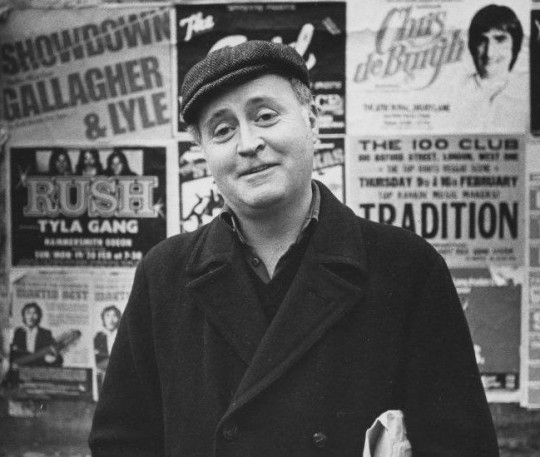
The battle to remove censorship from the British stage was fought primarily at the Royal Court theatre in London during the mid-1960s. The plays of Edward Bond, one of the most important British dramatists of the 20th century, who has died aged 89, were an essential part of that story and that struggle.
Bond had submitted plays to George Devine’s recently established English Stage Company at the Royal Court in 1958 and, as a result, was invited to join the theatre’s Writers’ Group. His first performed play, The Pope’s Wedding, was given in a production without decor on 9 December 1962, and Devine then commissioned a new play, which Bond submitted in September 1964.
That play, Saved, was presented privately for members of the English Stage Society in November 1965 after the lord chamberlain – the official censor to whose offices all new theatre plays had to be submitted – demanded cuts in the text. The play was the most controversial of its day, not just because of the explicitness of the sexual swaggering and dialogue, but because of a scene in which a baby is stoned to death in its pram.
The stays of middle-class propriety in the contemporary theatre had already been given a good vicious tug in the work of David Rudkin and Joe Orton, but this was something else. There was uproar in the theatre, and in the reviews, and a visit by the police. The theatre was hauled into court after an alleged minor breach of the club licensing laws, and many notable witnesses, including Laurence Olivier, spoke in the play’s favour. Penelope Gilliatt wrote in the Observer that the play was about brutishness, not brutish in itself: “The thing that makes Saved most painful to watch is the fact that the characters who won’t listen to other people’s desperate voices are in despair for lack of a listener themselves.”
Bond’s next play, Early Morning, was banned outright. It was a surreal fantasy, featuring Queen Victoria and Florence Nightingale as lesbian lovers, two conjoined twin princes, and cannibalism in heaven. Again, the vice squad paid a call, performances were cancelled and a private dress rehearsal arranged for the critics in April 1968.
By now the theatres bill was on its way in the House of Commons, becoming law in September. Plays were finally removed from the control of the lord chamberlain, who had held censorious sway over the nation’s entertainment since 1737. Violence, sex, political satire and nudity were bona fide subjects at last for the modern theatre.
William Gaskill, the artistic director of the Court in succession to Devine, mounted a Bond season in 1969 that established his reputation both in Britain and abroad, during a tour to Belgrade and eastern Europe. Saved was given 14 productions in West Germany and opened to acclaim in the Netherlands, Denmark, Japan, Czechoslovakia and the US.
This period was one of defiance at the Royal Court, and the experience marked everyone who worked there for life, none more so than Bond and Gaskill. Bond was acknowledged as the inheritor of Brecht’s legacy in the flintiness of his writing and the uncompromising artistic vision of his scenes and stage pictures.
He wrote many fine plays in the subsequent decade: his Lear (1971) was a majestic, pitiless rewriting of Shakespeare, with Harry Andrews unforgettably scaling a huge, stage-filling wall at the end; Bingo (1973) and The Fool (1975) drew chilling portraits of English writers – Shakespeare (played by John Gielgud at the Court – and by Patrick Stewart in a 2010 revival at Chichester) and the rural poet John Clare (Tom Courtenay) – at odds with their societies, driven respectively to suicide and madness; and The Woman (1978), the first new play to be produced on the National’s new Olivier stage, was an astounding, panoramic survey of Greek myths and misogyny.
Bond was born in Holloway, north London, one of four children. His parents were farm labourers in East Anglia and had come to London looking for work. Bond was evacuated during the second world war, first to Cornwall and later to live with his grandparents near Ely, Cambridgeshire. He attended Crouch End secondary modern school in London in 1946 and left when he was 15. “That was the making of me, of course,” he said, “you see, after that nobody takes you seriously. The conditioning process stops. Once you let them send you to grammar school and university, you’re ruined.”
He enjoyed the music hall and was impressed by Donald Wolfit as Macbeth at the Bedford theatre in Camden Town in 1948: “I knew all these people, they were there in the newspapers – this was my world.”
After school he worked as a paint-mixer, insurance clerk and checker in an aircraft factory before beginning his national service in 1953. He was stationed in Vienna and started to write short stories.
Once Saved had been performed and he knew he would always work in the theatre, he bought a house on the edge of a small village, Wilbraham, near Cambridge, and lived there contentedly with his wife, the German-speaking Elisabeth Pablé, a writer, whom he married in 1971 and with whom he collaborated on a new version of Wedekind’s Lulu based on some newly discovered jottings and manuscripts in the early 90s.
His early plays were often based in situations and societies he was familiar with, whatever their period setting, but Bond’s later work took on a more resonant, prophetic, some felt pompous, tone. Put simply, according to Richard Eyre and Nicholas Wright in Changing Stages, their 2000 account of the British theatre, Bond used to ask questions; now he gave answers.
He acquired a reputation as a rather remote guru, and his later, proscriptive epics about the failure of capitalism and the violence of the state were more often performed by amateurs than by the leading companies in Britain.
The Worlds (1979), for instance, was first given by amateurs in Newcastle, but its scope was immense, charting the collapse of a successful business operation riddled with strike action, terrorism, kidnappings and long speeches. In one of these, a terrorist defines the two worlds as one of appearance and one of reality. In the first, she says, there is right and wrong, the law and good manners. In the second, which controls the first, machines and power.
Before going into what he called voluntary exile from the British theatre establishment, Bond wrote the “pastoral” Restoration (1981) for the Court, an often witty inversion of a Restoration comedy, with Simon Callow in full flow as Lord Are, and Summer (1982) for the National, a comic, modern rendering of The Tempest set in the sunny Mediterranean.
Bond was a dapper, withdrawn man who could be intimidating, but disarmingly gnomic and self-deprecating when he was in the mood. Sympathetic interviewers could be treated to bilious attacks on directors such as Sam Mendes – whose 1991 revival of his 1973 comedy The Sea, a beautiful play of madness and dehumanisation in an Edwardian seaside town, he loathed – and Trevor Nunn (who, he said, turned the National Theatre into “a technicolour sewer”), though he never raised his voice and often dissolved into mischievous chuckling.
Even the collapse of eastern European socialism could not stem the flow of Bond’s writing. “Before, as a socialist writer,” he once told me, “you knew there was a framework, a system to which the play might eventually refer. But now, the problem of the last act has returned! And I was always a critic of the system to start with. That’s why I wrote my version of King Lear.”
More recently, you had to hunt pretty hard to find his new work. There was an intriguing season of six plays at the Cock Tavern in the Kilburn High Road, north London, in 2008, and several more performed by Big Brum, a theatre-in-education company in the Midlands, between 2012 and 2014.
Jonathan Kent directed a revival of The Sea at the Haymarket, starring David Haig and Eileen Atkins in 2008, while Sean Holmes provided the first London production of Saved in 27 years – still harrowing, more pertinent than ever – at the Lyric, Hammersmith, in 2011.
Following the example of Brecht, Bond was prolific in supplying his work with the extra apparatus of poems, prefaces and notebooks, though, unlike Brecht, a giant of an intellectual all-rounder in comparison, and a far superior poet, he was always better when restricting himself to stage dialogue.
He also wrote for films, including the screenplay for Nicholas Roeg’s Walkabout (1971), set in the Australian outback and starring Jenny Agutter and David Gulpilil, and the Nabokov adaptation Laughter in the Dark (1969), as well as contributing dialogue for Michelangelo Antonioni’s Blow-Up (1966) and Nicholas and Alexandra (1971).
At his best, he was a genuine poet of the stage, and exerted an enormous influence on at least two generations of theatre workers after him. It is possible that some of the unknown plays of his later, post-nuclear apocalyptic period will be ripe for assessment. The place of at least 10 of his earlier plays is secure in the national literature and they are certain to be revived. He remains much admired and often performed in France and Germany.
Elisabeth died in 2017.
🔔 Thomas Edward Bond, playwright and director, born 18 July 1934; died 3 March 2024
Daily inspiration. Discover more photos at Just for Books…?
4 notes
·
View notes
Text
#edward bond#playwright#death ment tw#rip#saved#bingo#lear#early morning#the sea#restoration#narrow road to the deep north#the war plays#dea#so the old guard shrinks a little more... not many of the great mid 20th century brit playwrights left now at all#rip ed. for saved alone you're guaranteed a place in the dramatic ledgers for all time
4 notes
·
View notes
Text
#edward bond#carlo brandt#sandrine laplace#stéphane bonnefoi#éric caravaca#cern#france culture#radio france
1 note
·
View note
Text
Weekend read: Duncan Gillies MacLaurin, 'The Real Pity'
No, Wilfred, I never believed your endeavour was more than a clever display. Did you think you could rescue the boys in the mess queue, or – no less grotesque – you’d betray your comrades by opting to stay in shock in Craiglockhart’s sick bay? Naive pretence is no defence for senseless sacrifice. Admit it, you were stupid to ignore Sassoon’s advice and blithely return to the fray, quite deaf to…
#Duncan Gillies MacLaurin#Edward Bond#Janet Kenny#long read#Pat Barker#Siegfried Sassoon#war#weekend read#Wilfred Owen#WW1
1 note
·
View note
Text
New shipping aesthetic just dropped:
Blonde autistic stealth-killers and their equally lethal yet wholesome dark-haired not-wives.




Bonus: the lovable shitheads they adopted.


#roy mustang#riza hawkeye#royai#loid forger#yor forger#twilight spy x family#yor briar#twiyor#fullmetal alchemist brotherhood#fullmetal alchemist#spy x family#spyxfamily#anya forger#bond forger#bond spy x family#edward elric#ed elric#alphonse elric#al elric#shipping#fma#fmab#sxf
499 notes
·
View notes
Text



It’s about the yearning
[supergoodflag]
#supernatural#spn#dean winchester#destiel#castiel#deancas#misha collins#jensen ackles#spn crack#good omens#ineffable husbands#aziraphale#aziracrow#crowley#david tennant#michael sheen#ofmd#our flag means death#stede bonnet#ed x stede#blackbeard#blackbonnet#gentlebeard#taika waititi#rhys darby#blackbeard x stede#edward x stede#edward teach#wall slam#profound bond
596 notes
·
View notes
Text


gahhh my semester is finally over which means I can finally draw again!!!! College suckz.
Anyways this drawing is dedicated to the 20 last ppl still thinking abt this stupid idiot .
The dumb sketch at the bottom is bc my friend said he looked like one of those toys that the eyes pop out of …
#the batman 2022#batman 2022#riddler 2022#paul dano riddler#dano riddler#edward nashton#artists on tumblr#my art#riddler year one#the riddler#riddler#the hyperfixation bond of a woman and her favorite fictional redditor#paul dano
1K notes
·
View notes
Text
i got notes on this post and it made me think: what if bella didn't remember anything when she woke up as a vampire. clean slate, just like alice.
her shield is powerful enough to have manifested as a human + she's "good at blocking unpleasant things" or whathaveyou, so what if the pain of the transformation just makes her shield go into overhaul and wipe her hard drive?
you have your typical amnesia-trope tragedy of not recognizing your loved ones, but the family standing around smiling expectantly at you turns out to be a whole ass coven of vampires. they admit to just having turned you into a vampire. but don't worry you totally wanted to be a vampire, you were actually begging your vampire boyfriend for it, trust them!! yes they know who your loved ones are but you can't contact them because you'll want to kill them. you actually have to avoid humans for a few years, probably. welcome to the fam :)
#we are IGNORING breaking dawn because the horror of that baby is enough without amnesia thanx#sure you can use a mate bond or whatever to make bella instantly comfortable around edward but that's CHEATING imo#make em SWEAT#bella needs a little convincing that this isn't a cult. and they're like. look. we kind of are by some loose definitions. but it's chill#twilight#hoa5#just taking my joke post straight into horror territory i guess
48 notes
·
View notes
Text
Ed waited until the day Al could stand without crutches to finally, finally,
Kick him in the back of the knee to get revenge for constantly doing that shit when he was armor (impervious to leg buckling)
#heartfelt sibling bonding? who needs that when you can make your little brother collapse instantly with one simple trick#fullmetal alchemist#fma brotherhood#edward elric#alphonse elric
266 notes
·
View notes
Text

#james bond#the wicker man#britt ekland#roger moore#edward woodward#christopher lee#fill in the blank#folk horror
145 notes
·
View notes
Text
Batman: That's enough, Riddler! Time to end this!
Riddler: Good luck, Batman! All the cards are in my hand!
Batman: Uh, Eddie, that's not exactly how you win.
Batman, putting down a card: Anyways, Uno....
Riddler, throwing his cards on the table: GODDAMMIT!
#bruce wayne is an uno queen#riddler is diehard stacking 4+ cards#but bruce is too much of a gd rule follower to allow that#booooo batman#uno is ALWAYS stacking 4+ cards#everyone expects batman to play chess or mahjong#but dick grayson always wanted to play uno or gold fish with bruce when he first adopted him#so now bruce is extremely biased towards uno#bc if was the first time him and dick bonded#now he plays uno with eddie bc dick moved to bludhaven and bruce is SAD#batman#bruce wayne#riddler#edward nygma#batfam memes#batfam#dc comics#dc universe#the batman#robert pattinson#paul dano#the batman 2022#dano riddler#dick grayson#nightwing#robin dc#batman and robin#batman and riddler
238 notes
·
View notes
Text
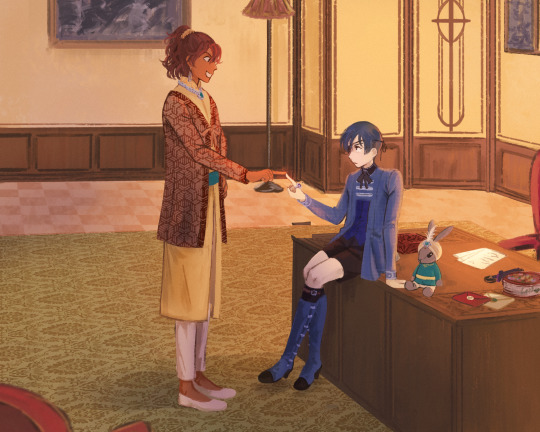
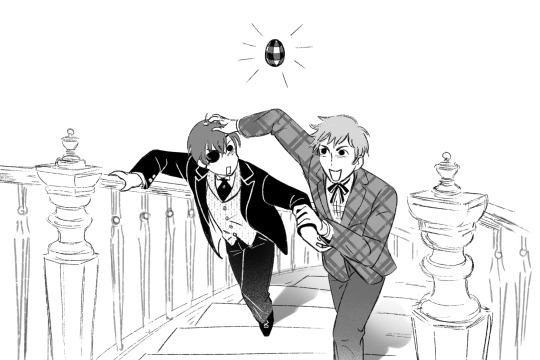

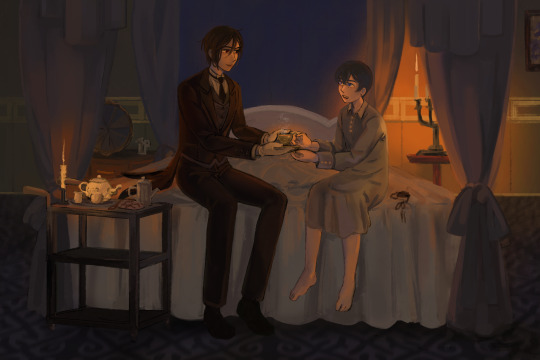
A compilation of art for my Dadbastian fanfic Coattails that I commissioned from the incredibly talented @karafina! They went above and beyond with the details... Each picture feels as cozy and warm as a storybook, right? I'm so delighted with how they turned out!! Thank you for making each one so beautiful! 🥹🥹🥹
#coattails#not sebaciel so please don't tag as such! thank you!#kuroshitsuji#the backgrounds are just gorgeous.. thank you for your research and dedication to them#the outfits in the first one are amazing! I love Ciel's shirt and Soma's whole ensemble is so cozy yet regal#look at Ciel in the cardigan in the third one though? he is cozy#the expressions are my favorite. they're so animated! just as I imagine them to be..#I really like Ciel's in the first pic because I imagined him looking annoyed but you actually made him seem curious#and I actually like that more I think it's cute... he really does want to be friends with Soma huh 🥺#Sebastian's expression in the third picture is great. >:o#he's about to throw hands with an old lady#Edward and Ciel's competitive faces! being silly... I love Them#Ciel needs to get swept up in silly competitions more often I think...#and then the last one!! bonding over tea! it's so amazingly tender 😭#I don't think I imagined it coming out so calming and gentle... it's so emotional#it makes me want to keep writing!#if you are a Coattails reader I hope you love these as much as I do!#and if you aren't a Coattails reader... maybe these will convince you to become one? 😏 because they are so full of personality!#thanks times a million tomoyoo!!#(I should wait till tomorrow to post but I want to do it now...)#Coattails fanart#(adding to the fanart tag even though I commissioned it just for convenience's sake)
751 notes
·
View notes
Text
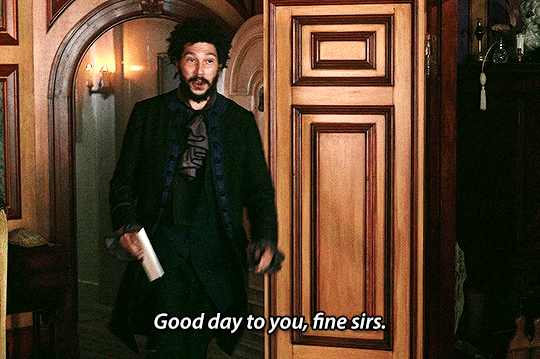
Ed and Frenchie connecting right away always makes me smile.
Their connection in 1x5 feels instinctual. We see Frenchie carefree, walking into the captain's quarters with a flourish in his new outfit. He's comfortable with them, and when Ed and Stede decide to go to the party, Ed right away asks Frenchie to come along if he doesn't have any plans.
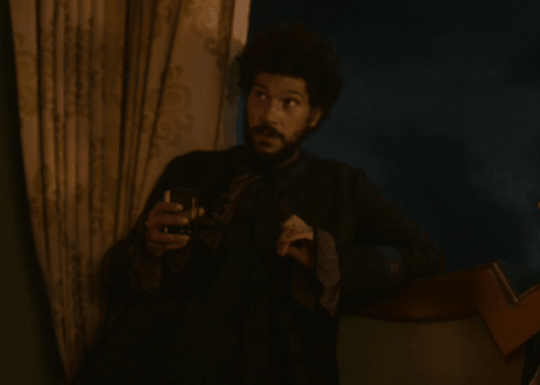
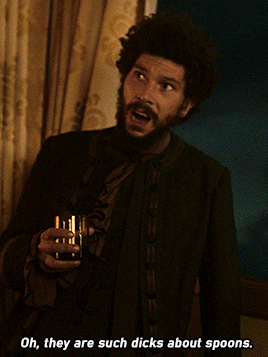
Then when Ed walks out of the party upset Stede is not the only one to respond to that. Frenchie's body language immediately changes from relaxed and having fun to standing straight up, concern on his face followed immediately by a crack at the societal people.
We don't see it directly on screen but Frenchie and Olu used their earlier agreement with Abshir over the pyramid scheme to get Stede the information for the passive aggression moment.
We don't know much about Frenchie's past, only that he worked in "service," can play the lute, and is an absolute gem at pulling off ploys.
I have written about how Frenchie and Ed have similar coping mechanisms with their trauma, and while not on the surface or talked about, it adds to their connection.
(This connection also explains why Ed keeps Frenchie aboard at the end of the first season and why he chooses Frenchie to be first mate.)
Now I feel like I'm rambling but my point is, we learn so much about Frenchie's character in this episode and the relation between Ed and Frenchie is instant and sweet. I love the effortlessness behind connections between people in this show.
The Best Revenge is Dressing Well is a great episode and these small moments, this link makes it all the more deeper.
#ofmd#our flag means death#ofmd edward teach#ofmd frenchie#stede bonnet#their bond is special to me#ofmd 1x5#the best revenge is dressing well
249 notes
·
View notes